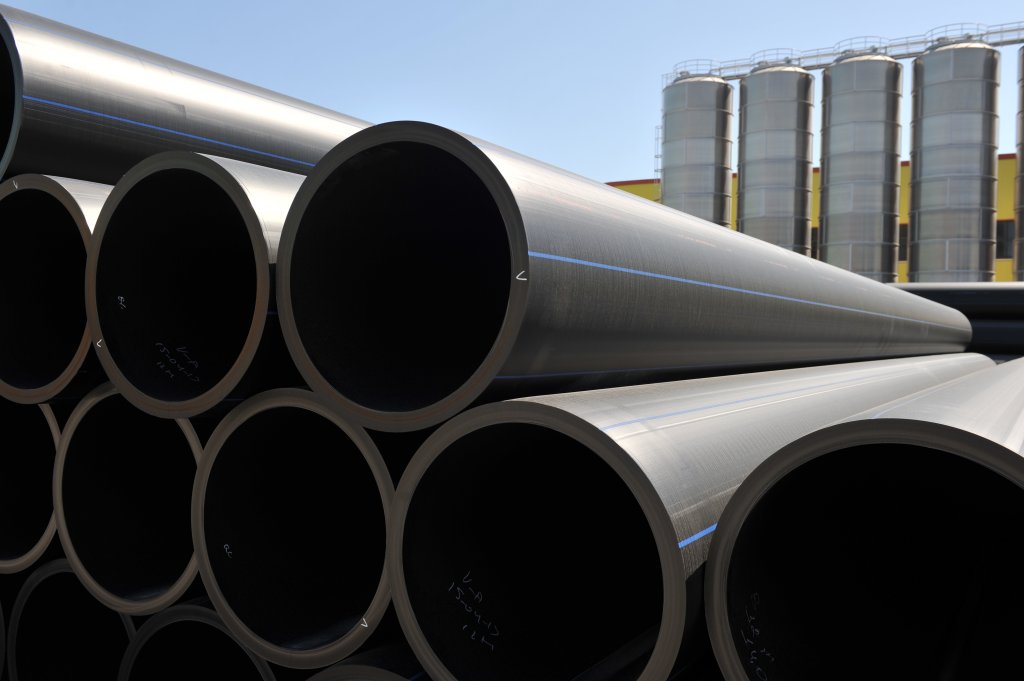Pipe Manufacturing Midland TX: Process Explained
Comprehending the Trick Advantages of HDPE Pipeline for Water and Wastewater Administration
Using HDPE pipe in water and wastewater management provides countless benefits that merit factor to consider. Its exceptional sturdiness and lengthy lifespan make it a preferred choice for numerous projects. In addition, the material's resistance to deterioration and chemical damages boosts its reliability in various atmospheres. The advantages extend beyond just durability and resistance. Texas hdpe pipe manufacturer. Exploring its cost-effectiveness and environmental effect reveals much more compelling factors for its widespread adoption in modern-day infrastructure
Extraordinary Resilience and Long Life

HDPE pipe sticks out for its exceptional sturdiness and longevity, making it a preferred choice in water monitoring systems. Constructed from high-density polyethylene, these pipelines can withstand considerable pressure and stress, ensuring dependable efficiency in time. Their robust nature enables them to endure severe environmental conditions, consisting of temperature fluctuations and dirt movements, which can cause other products to stop working.
The life expectancy of HDPE pipes commonly goes beyond half a century, giving a cost-efficient remedy for communities and markets alike. In addition, the product's lightweight residential or commercial properties simplify setup, reducing labor expenses and durations. This sturdiness lessens the demand for regular repairs or replacements, further improving its financial appeal.
In water administration applications, the integrity of HDPE pipelines implies fewer disruptions and enhanced solution connection, making them essential to lasting infrastructure advancement. The combination of toughness and durability strengthens HDPE's role as a foundation in reliable water monitoring remedies.

Resistance to Deterioration and Chemical Damage
While numerous materials catch corrosion and chemical damages in time, HDPE pipelines show amazing resistance, making them perfect for different water monitoring applications. This durability stems from the molecular framework of high-density polyethylene, which is naturally non-reactive and does not rust like steels or weaken from direct exposure to extreme chemicals. Because of this, HDPE is highly reliable in atmospheres with hostile compounds, such as wastewater systems that may consist of acids, bases, and organic solvents.
Additionally, HDPE pipelines can withstand environmental aspects such as dirt level of acidity and saline conditions, additionally improving their viability for diverse applications (Texas hdpe pipe manufacturer). Their capacity to preserve architectural honesty in time decreases the threat of leaks and failings, which is critical in guaranteeing the safety and reliability of water distribution and wastewater monitoring systems. The resistance to corrosion and chemical damage noticeably adds to the total performance and long life of HDPE piping options.
Cost-Effectiveness and Economic Benefits
When considering the economic implications of water management systems, the cost-effectiveness of HDPE pipelines becomes apparent. These pipes use reduced installation and upkeep costs compared to conventional materials like steel or concrete. Their lightweight nature simplifies transportation and setup, leading to minimized labor costs. Furthermore, HDPE pipelines show a lengthy life-span, frequently surpassing 50 years, which equates to less substitutes and lasting financial savings.
Additionally, the resistance of HDPE to rust and chemical damages minimizes the demand for expensive repair services and replacements. The pipes also support efficient water circulation, decreasing power prices linked with pumping systems. By reducing leaks and water loss, HDPE pipelines add to significant economic advantages for districts and industries alike. Generally, the initial financial investment in HDPE piping can yield significant financial returns over the life expectancy of the water monitoring system, making it a prudent choice for lasting facilities growth.
Ecological Sustainability and Reduced Impact

Convenience and Adaptability in Installation
Due to their one-of-a-kind residential or commercial properties, HDPE more info pipes use remarkable versatility and flexibility in installation, making them appropriate for a vast array of applications. Their light-weight nature permits much easier handling and transport, lowering labor costs and installation time. HDPE pipelines can be bent and shaped to fit various terrains and project needs, which is especially useful in testing settings.
Furthermore, their resistance to deterioration and chemical damage permits setup in diverse setups without the need for specialized protective finishes. The capability to fuse joints creates a continuous, leak-free system, improving the total honesty and reliability of the installation. HDPE's flexibility also accommodates ground activity, minimizing the danger of damages in locations vulnerable to shifting soil. Overall, these characteristics make HDPE pipes not just flexible however also a favored choice for water and wastewater monitoring systems.
Frequently Asked Inquiries
Just How Does HDPE Pipe Compare to PVC in Water Monitoring Applications?
HDPE pipeline offers remarkable adaptability, resistance to rust, and longevity compared to PVC. Its lighter weight facilitates simpler installment, while its long life-span lowers substitute prices, making HDPE a preferred choice in water administration applications.
What Is the Life Expectancy of HDPE Water Lines Under Common Conditions?
Under typical problems, HDPE pipes can have a lifespan varying from 50 to 100 years. Their longevity and resistance to corrosion add to their long-term performance in various applications, making them a trustworthy selection for framework.
Are HDPE Water Lines Recyclable After Their Solution Life?
Yes, HDPE pipelines are recyclable after their solution life. American Plastics HDPE Pipe Manufacturing. They can be processed and repurposed right into new items, significantly lowering ecological impact and promoting sustainability within the industry, making them an environmentally friendly option for piping services
What Is the Installation Process for HDPE Pipes?
The installment process for HDPE pipes entails website prep work, trenching, pipe blend or mechanical joining, backfilling, and stress screening. Correct techniques guarantee a long lasting and efficient system for transporting water and wastewater successfully.
Can HDPE Pipeline Be Made Use Of for Both Potable and Non-Potable Water Solutions?
Yes, HDPE pipes can be made use of for both safe and clean and non-potable water systems. Their convenience, resilience, and resistance to deterioration make them appropriate for numerous applications, guaranteeing safe and effective transportation of water in different contexts.